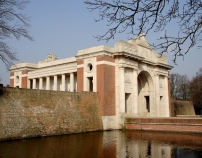| First Name: | James | Last Name: | ALEXANDER | |
|---|---|---|---|---|
| Date of Death: | 22/10/1914 | Lived/Born In: | Deptford | |
| Rank: | Private | Unit: | Royal West Surrey (Queens)1 | |
| Memorial Site: | Menin Gate, Ypres | |||
Current Information:Age-34 5, Napier Street, Deptford
First Battle of Ypres Between 21st October and 22nd November, 1914 a desperate fight took place around the Belgium city of Ypres, the first of three major battles that were to be fought there during the course of the war. British troops entered Ypres in October. The 1st and 2nd Divisions plus the 3rd Cavalry Division had made their way up from the Aisne as part of the “Race to the Sea”, whilst the 7th Division came west to Ypres after Antwerp had fallen. The Germans knew that Ypres was the gateway to the Channel ports and that these were vital to Britain’s war effort so they poured reinforcements into the area. The fighting fell into three distinct battles; the Battle of Langemarck, 21-24 October, the Battle of Gheluvelt, 29-31 October and the Battle of Nonne Bosschen, 11 November. Ypres did not fall to the Germans but its defence during these two months resulted in the destruction of much of the old regular British Army. On 21st October, the advance guard of 1st Division, the 1st Royal West Surrey (Queens), 1st South Wales Borderers and 1st Gloucestershire battalions, all of 3 Brigade, marched to Langemarck where they found a French territorial battalion in possession of the village. At 8.30 am, 1st South Wales Borderers and 1st Queens were sent to attack Poelcappelle and its station respectively The station was 2000 yards north of the village and from where Germans had been seen advancing. Steady forward progress was made by these two battalions and the Germans fell back to their entrenched positions of the previous night. But at 2.30 pm the two leading companies of 1st South Wales Borderers were heavily counter attacked along a broad front. They suffered severe losses and were forced to give ground which uncovered the right of 1st Queens who at first threw back a flank but were eventually compelled to conform to the retirement and in the process also suffered many losses. Both battalions rallied and dug in a short distance back where they remained for most of the next day during which James Alexander was killed. |
||||
| « Back to Search Results | ||||
| If you think any of the information shown here is incorrect, Click Here to submit your amends and comments | ||||




